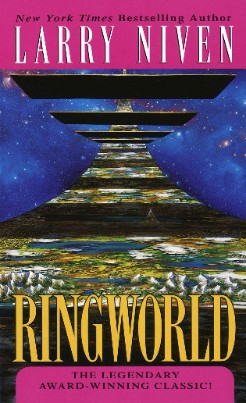In the nighttime heart of Beirut, in one of a row of general-address transfer booths, Louis Wu flicked into reality.
His foot-length queue was as white and as shiny as artificial snow. His skin and depilated scalp were chrome yellow; the irises of his eyes were gold; his robe was royal blue with a golden steropic dragon superimposed. In the instant he appeared, he was smiling widely, showing pearly, perfect, perfectly standard teeth. Smiling and waving. But the smile was already fading, and in a moment it was gone, and the sag of his face was like a rubber mask melting. Louis Wu showed his age. For a few moments, he watched Beirut stream past him: the people flickering into the booths from unknown places; the crowds flowing past him on foot, now that the slidewalks had been turned off for the night. Then the clocks began to strike twenty-three. Louis Wu straightened his shoulders and stepped out to join the world.
In Resht, where his party was still going full blast, it was already the morning after his birthday. Here in Beirut it was an hour earlier. In a balmy outdoor restaurant Louis bought rounds of raki and encouraged the singing of songs in Arabic and Interworld. He left before midnight for Budapest.
Had they realized yet that he had walked out on is own party? They would assume that a woman had gone with him, that he would be back in a couple of hours. But Louis Wu had gone alone, jumping ahead of the midnight line, hotly pursued by the new day. Twenty-four hours was not long enough for a man's two hundredth birthday.
They could get along without him. Louis's friends could take care of themselves. In this respect, Louis's standards were inflexible.
In Budapest were wine and athletic dances, natives who tolerated him as a tourist with money, tourists who thought he was a wealthy native. He danced the dances and he drank the wines, and he left before midnight.
In Munich he walked.
The air was warm and clean; it cleared some of the fumes from his head. He walked the brightly lighted slidewalks, adding his own pace to their ten-miles-per-hour speed. It occurred to him then that every city in the world had slidewalks, and that they all moved at ten miles per hour.
The thought was intolerable. Not new; just intolerable. Louis Wu saw how thoroughly Munich resembled Cairo and Resht...and San Francisco and Topeka and London and Amsterdam. The stores along the slidewalks sold the same products in all the cities of the world. These citizens who passed him tonight looked all alike, dressed all alike. Not Americans or Germans or Egyptians, but mere flatlanders.
